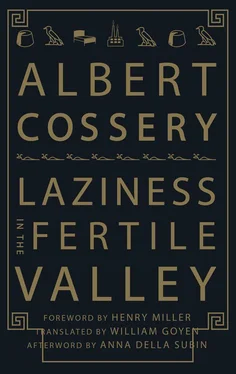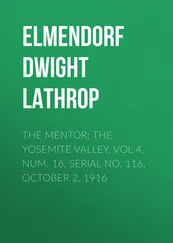Albert Cossery - Laziness in the Fertile Valley
Здесь есть возможность читать онлайн «Albert Cossery - Laziness in the Fertile Valley» весь текст электронной книги совершенно бесплатно (целиком полную версию без сокращений). В некоторых случаях можно слушать аудио, скачать через торрент в формате fb2 и присутствует краткое содержание. Год выпуска: 2013, Издательство: New Directions Publishing Corporation, Жанр: Современная проза, на английском языке. Описание произведения, (предисловие) а так же отзывы посетителей доступны на портале библиотеки ЛибКат.
- Название:Laziness in the Fertile Valley
- Автор:
- Издательство:New Directions Publishing Corporation
- Жанр:
- Год:2013
- ISBN:нет данных
- Рейтинг книги:3 / 5. Голосов: 1
-
Избранное:Добавить в избранное
- Отзывы:
-
Ваша оценка:
- 60
- 1
- 2
- 3
- 4
- 5
Laziness in the Fertile Valley: краткое содержание, описание и аннотация
Предлагаем к чтению аннотацию, описание, краткое содержание или предисловие (зависит от того, что написал сам автор книги «Laziness in the Fertile Valley»). Если вы не нашли необходимую информацию о книге — напишите в комментариях, мы постараемся отыскать её.
Laziness in the Fertile Valley — читать онлайн бесплатно полную книгу (весь текст) целиком
Ниже представлен текст книги, разбитый по страницам. Система сохранения места последней прочитанной страницы, позволяет с удобством читать онлайн бесплатно книгу «Laziness in the Fertile Valley», без необходимости каждый раз заново искать на чём Вы остановились. Поставьте закладку, и сможете в любой момент перейти на страницу, на которой закончили чтение.
Интервал:
Закладка:
“What time is it?”
Serag started, looking at him without understanding.
‘The time?” he said. “I don’t know. I haven’t a watch. Are you in a hurry?”
“All rich people have watches,” said the child sententiously. “There are lots of rich people in the city. They even have gold watches; I’ve seen them.”
“Some day, I hope, you’ll have a gold watch too,” said Serag.
“Me!” cried the child. “It’s impossible. Unless I steal it.”
“Ah well! you’ll steal it.”
On the road back, the child closed himself in morose silence. He no longer limped, having assumed an air of abused dignity. Decidedly, he understood there was no more to be gained from his chance companion. He was ready to leave him at once. Other adventures called him.
Coming to the highway, they stopped. Serag drew his hands from his pockets, stood a moment, his arms swinging, not knowing how to separate from the child. He remembered he hadn’t yet learned his name.
“What’s your name?” he asked.
“Antar,” the child replied.
He had flung his name like a defiance.
Serag was disappointed; the name Antar seemed wrong, too pretentious for the memory he wished to keep of the child. He asked again:
‘Tell me, haven’t you another name?”
“Another name!” the child was astonished. “Why? Don’t you like this one?”
Serag was embarrassed and couldn’t explain himself.
“I’d like to know if you haven’t another name; that is, a nicer one — a nickname. For instance, the name your mother calls you when she plays with you.”
“By Allah! You’re a fool!” cried the child. “Do I look like a drooling baby to be played with?”
“Don’t be angry. I didn’t mean to insinuate anything. If you ever come back this way, don’t forget to come see me. My name is Serag,” he shouted after the retreating child.
The child left, and suddenly Serag found himself terribly alone. He stayed by the side of the road a few minutes, undecided, then started to walk towards the house.
It was a large asphalt road, bordered by old trees. Serag walked in the middle of it, his back stooped and his eyes fixed on the ground, sifting the disturbing details of his meeting with the child. He was gone now, with his strange ardor and his passion for life. Since he had left, Serag felt an emptiness he had never experienced before. A car raced by a few inches from him, its muffler open. An odor of exhaust fumes spread in the air, stung his nostrils and almost suffocated him. He coughed; his eyes brimmed with tears. He went over to the side of the road, waited a moment until the cough stopped, then tranquilly began to walk on. Again the memory of the child came to him, and he thought of abandoning everything to rejoin him. He stopped, looked behind in hopes that perhaps he’d see him again, but the highway was empty as far as the horizon.
From time to time he would pass a villa, surrounded by an iron grill and with its shutters closed. A whole world at its ease lived there in permanence, sickly and proud in its retirement. Serag wondered what they could be plotting behind those walls — those people buried in their miserable lives like rats at the bottom of their holes. What absurd degradation! And all around him the same thing. Wouldn’t he ever get out of this enormous farce, this stagnation? Surely there must be some part of the world where there were living beings and not these pitiful corpses. But where?
On his right there was now a large block of houses, a few of three and four stories, unpretentious and some very old, with falling plaster. Here lived the petty bourgeois — retired civil servants — who had fled the uproar of the city to come and grow mouldy on the hideous outskirts of this street. Farther along, the houses had invaded the fields on both sides of the road and spread like a city across the tillage. Narrow alleys were formed between them; alleys of packed earth on the uneven, rubbish covered ground. Linen of all colors was drying in the windows, the only bright spots that cheered the desolate, grey agglomeration, a little. A few people made fugitive appearances, as if to give death one rude contradiction.
Serag turned toward the right side of the road. For a distance of ten yards some low one-story constructions stood in a line. They were a group of shops devoted to small trade. Serag stopped in front of the first shop.
“Greetings, Abou Zeid.”
The man squatting on the steps of his shop raised his head, became somehow animated without stirring, and replied to the young man with a resigned carelessness. He was singularly filthy, with bloodshot eyes and a toothless, slobbering mouth. A shaggy beard, badly dyed, ravaged this face of a somnolent prophet. He wore a skullcap of braided linen, and a long brown shawl covered most of his body. Peacefully leaning against a wall of the shop, he warmed himself in the scant rays of a hesitant and colorless sun. Some baskets filled with peanuts, a few withered peas, and some watermelon seeds were near him on a low shelf. Inside, the shop was empty.
“How’s business?” asked Serag.
“Allah curse business and those who invented it!” replied Abou Zeid. “It’s an evil sent for my old age. I just manage to eke out the rent of this cursed store.”
“It’s a big shire for selling peanuts, Abou Zeid, my father! I’ve already told you. Besides, selling peanuts isn’t a trade for a man.”
“What’s a man to do, my son?” murmured Abou Zeid, “You haven’t yet bit upon an idea? I’m in your hands.”
“I’m still looking,” said Serag.
He went up to one of the baskets, took a handful of withered nuts and put them greedily in his mouth. He chewed them a long time, perplexed, troubled by a strange uneasiness. Actually, he didn’t know what role to play before this ridiculous shop. It wasn’t the sort of work he wanted to be near; it was only one of the malicious aspects of a public laziness. Abou Zeid leveled a look of atonement at him, full of resolute stupidity and shrewd admiration. For a long time he had complained to the young man that his shop was too large to sell peanuts. He felt an instinctive sympathy for him, in whom curiosity and the passion for sleep mixed. As for Serag, he often came to gossip with the old vendor; above all he loved to hear the obscene stories of his many conjugal crises. Abou Zeid knew the reputation of the young man’s relatives and held their eccentricities in high esteem, finding them to his own taste. He was strongly inclined to a certain form of chronic torpor himself. Thus a business suggestion coming from a family so idle could in no way be dangerous nor, above all, threaten much work. Abou Zeid waited, peace in his soul, for the young man to squander his generous advice.
There was a moment of silence. From time to time, Abou Zeid scratched under his clothing, caught a louse and crushed it between his nails, closing his eyes with satisfaction. He seemed to be performing a solemn ritual, moving with a calculated slowness. After having exterminated some of these undesirables, he asked suddenly, his face almost jovial:
“Tell me, my son, is it true that your brother Galal bids you all goodbye before going to bed?”
“Why should he say goodbye? Please talk sense.”
“It seems he sleeps for a whole month without waking,” continued Abou Zeid. “Is that true, my son?”
A smile of admiration touched his toothless mouth like a wound.
“It’s malicious gossip,” said Serag. “How could you believe such things? It’s true my brother Galal sleeps a great deal. Sometimes a whole day. But to sleep for a month — no one in the world could do it. Believe me, it’s nothing but gossip.”
“The world is so spiteful,” said Abou Zeid with a certain deceit. “Men say so many things.”
Читать дальшеИнтервал:
Закладка:
Похожие книги на «Laziness in the Fertile Valley»
Представляем Вашему вниманию похожие книги на «Laziness in the Fertile Valley» списком для выбора. Мы отобрали схожую по названию и смыслу литературу в надежде предоставить читателям больше вариантов отыскать новые, интересные, ещё непрочитанные произведения.
Обсуждение, отзывы о книге «Laziness in the Fertile Valley» и просто собственные мнения читателей. Оставьте ваши комментарии, напишите, что Вы думаете о произведении, его смысле или главных героях. Укажите что конкретно понравилось, а что нет, и почему Вы так считаете.












